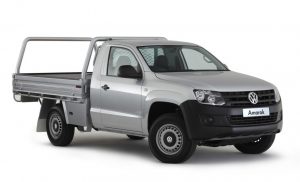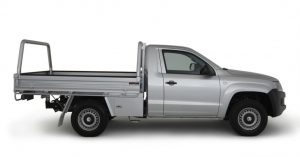Recalls: Volkswagen 2H Amarok cab chassis
Overview
Manufacturers, or importers, issue recalls for defects or faults which have the potential to cause injury. Generally, manufacturers will inform the original buyers if their vehicle is subject to a recall and of the steps required to remedy the defect or fault. Please note that the recalls below (if any) are for Australian-delivered vehicles only. Furthermore, the number of recalls should not be taken as an indication of a model’s reliability or its safety more generally.
Recalls: Volkswagen 2H Amarok cab chassis
Volkswagen 2H Amarok: potential diesel fuel leak
In November 2013, a recall was issued for Volkswagen 2H Amarok cab chassis vehicles due to incorrectly positioned fuel pipes within the engine compartment. This defect, combined with vibrations in the engine bay, could lead to chafing or cracks developing in the fuel pipes. If this occurred, diesel fuel may leak and pose a fire hazard. As part of the recall, a chafe protector was to be fitted to the fuel line at affected points to prevent damage. Furthermore, a secondary issue was identified with genuine towbars fitted to the same range of Amarok vehicles as the towbar did not comply with the height requirements of ADR 62/02 (PRA 2013/13842).
Volkswagen 2H Amarok: loose front brake calliper and potential lock-up
In June 2015, a recall was issued for MY2015 Volkswagen Amarok vehicles. On certain Amarok vehicles, the bolts for the front brake callipers may not have been tightened with the specified torque. If bolt tension was lost, the loose brake calliper may make noise, damage the wheel and, at worst, cause the wheel to lock up which could cause a loss of control and possibly an accident (PRA 2015/14765).
Volkswagen 2H Amarok 2.0 TDI: software update to reduce NOx emissions
In October 2015, a recall was issued for 2011-12 Volkswagen Amarok cab chassis vehicles with 2.0-litre EA189 diesel engines. According to the recall notice, ‘the emissions levels may not meet regulatory requirements when the affected vehicle is driven under normal conditions’ (see ‘Diesel engines: NOx emissions “defeat device”‘, below). For the 2.0-litre EA189 engine, a software update will be introduced which takes advantage of improved simulation of air currents inside the air intake system. Volkswagen aims to implement the software update from January 2016; the labour time for installing the updated software is around half an hour. Owners could determine if their vehicles were part of the recall by visiting volkswagendieselinfo.com.au (PRA 2015/14950).
2016 and 2017 model year Volkswagen 2H Amarok cab chassis: airbag and/or belt tensioner may not deploy
In April 2017, a recall was issued for 2016 and 2017 Volkswagen 2H Amarok cab chassis vehicles. In the event of a collision, variations in the mixture ratio of propellant for the airbag and belt tensioner may prevent them from deploying; failure to deploy would increase the risk of injury to occupants. For the VINs of the recalled vehicles, please see PRA 2017/16019.
2017-18 model year Volkswagen Amarok V6 TDI: loss of power steering assistance
In January 2018, a recall was issued for 2017 and 2018 ‘model year’ Volkswagen Amarok vehicles that had 3.0-litre turbo diesel engines. During production, a clip may have been fitted incorrectly and this could damage the power steering return hose, cause hydraulic fluid to leak and for power steering assistance to be lost. The loss of power steering assistance would affect the handling of the vehicle, posing a safety risk to vehicle occupants and other road users. For the VINs of the recalled Volkswagen Amarok V6 TDI vehicles, please see PRA 2017/16504.
2016-17 Volkswagen 2H Amarok: front seat wiring harness
In July 2019, recall campaign 97DL was issued for Volkswagen Amarok vehicles that were available for sale from 1 October 2016 to 31 October 2017. Due to a production fault, the front seat wiring harness in these vehicles may be damaged. If the front seat wiring harness was damaged, it could cause local heat damage or cause the front seat to move automatically. For the VINs of the recalled vehicles, please see PRA 2019/17694.
2016-19 Volkswagen Amarok: cable securing spare wheel could snap
In March 2021, recall campaign 66L9 was issued for Volkswagen 2H Amarok vehicles that were available for sale in Australia from 1 August 2016 to 1 March 2019. Under certain conditions, the cable for the spare wheel winch could be weakened and snap when used. If this occurred, the spare wheel would then only be secured by the secondary securing strap. If the spare wheel detached, this could result in a collision and injury to other road users. For the VINs of the recalled vehicles, please see PRA 2021/18861.
Problems and faults: Volkswagen 2H Amarok cab chassis
Overview
This section identifies potential problems, causes and fixes based on the experiences of owners and repairers, online sources and technical service bulletins. This information is provided solely for reference purposes and AustralianCar.Reviews recommends that only properly qualified persons carry out repairs or modifications. Furthermore, the number of items below should not be taken as an indicator of a model’s reliability or the frequency with which they may occur.
To report a problem or fault to the AustralianCar.Reviews team, please use the Contact Us form. Note that AustralianCar.Reviews does not offer advice on automotive problems or disputes; such enquiries will not receive a reply. For vehicles purchased from dealers after 1 January 2011, please see our Australian Consumer Law fact sheet.
Amarok TDI: serpentine/accessory drive belt and engine failure
For Volkswagen Amarok vehicles with turbo-diesel engines, there have been reports of the serpentine/accessory drive belt failing prior to its 75,000 kilometre change over interval.
If the serpentine belt fails, parts of the belt could get past the timing belt cover and contact the timing belt – this could affect the engine’s valve timing such that the valves may contact the pistons; if this occurred, the cylinder head or the entire engine may require replacement. It is understood that Volkswagen introduced a revised timing belt cover/guard in May 2012 to better protect the timing belt in the event of serpentine belt failure.
Premature wear of the serpentine/accessory drive belt may be due to a misaligned pulley. To avoid premature failure, however, it is recommended that the serpentine belt be changed when it starts making noise or at 60,000 kilometre intervals (whichever comes first).
Diesel engines: NOx emissions “defeat device”
Australian-delivered Volkswagen 2H Amarok cab chassis vehicles powered by 2.0-litre diesel engines that were available for sale from 2011 to 2012 had software in the electronic control module (ECM) that could sense – via sensors measuring the position of the steering wheel, vehicle speed, the duration of the engine’s operation and barometric pressure – when the vehicle was undergoing emissions testing. The ECM would then run a ‘dyno calibration’ to produce lower nitrous oxide emissions during testing. At all other times, the ECM would run a separate ‘road calibration’ which reduced the effectiveness of the emission control system, specifically the selective catalytic reduction (SCR) or the lean NOx trap.
Based on testing conducted by the EPA and the California Air Resources Board (CARB), NOx emissions for the ‘road calibration’ were 10 to 40 times higher than US standards – this led the United States Environmental Protection Agency (EPA) to issue a notice of violation under the Clean Air Act. As a result, these vehicles did not meet the environmental standards claimed by Volkswagen.




